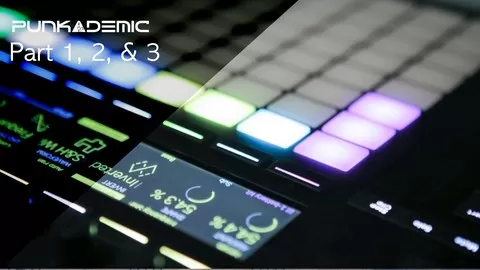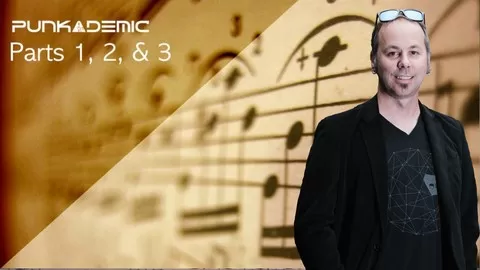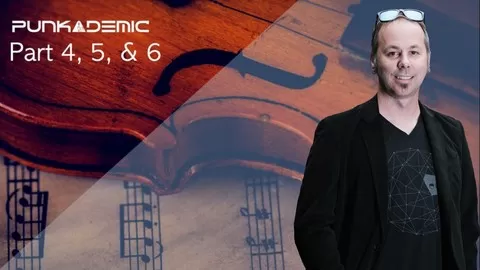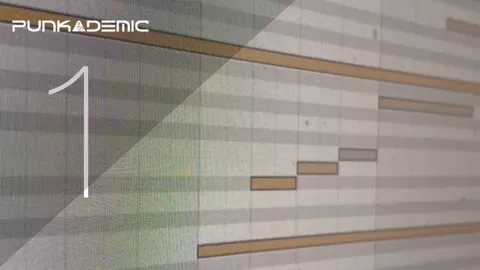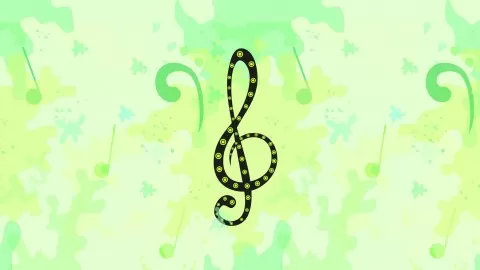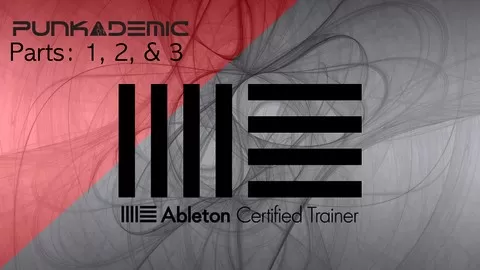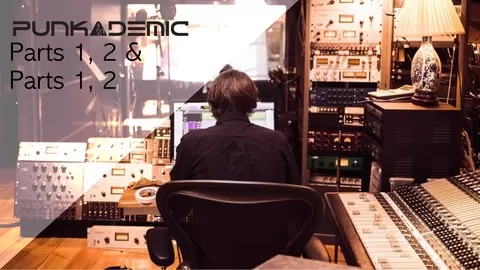This course was last updated on 4/2022.
We analyzed factors such as the rating (4.7/5) and the ratio between the number of reviews and the number of students, which is a great signal of student commitment.
** UDEMY BESTSELLER **
This course is “5-Star Certified” by the International Association of Online Music Educators and Institutions (IAOMEI). This course has been independently reviewed by a panel of experts and has received a stellar 5-star rating.
100% Answer Rate! Every single question posted to this class is answered within 24 hours by the instructor.
Welcome to the MUSIC THEORY FOR ELECTRONIC MUSIC COMPLETE Guide!
This course is a combination of all three of my Music Theory for Electronic Musicians classes: Music Theory for Electronic Musicians, and Music Theory for Electronic Musicians 2, and Music Theory for Electronic Musicians 3.
In this class, we learn how to work with the piano roll editor in a DAW to make harmonies, melodies, and whole tracks, and then we expand on those ideas and work with harmonic patterns (harmony) that is richer than just major and minor.
Production Techniques Through Theory The most important part of this class is an extensive foray into using these techniques in actual tracks. I’ll be creating 9 tracks through this class, right along with you, each using a different technique so you can see exactly how I incorporate it right into my music.
Full Sessions After each production project, I’ll give you the whole session of what I made using the techniques for you to play with. You can download it, expand on it, re-work it, and even release it as your work.
If Your Music is Missing Something, This is Probably It. If you are finding that you are writing track after track, and while they sound good, there is something they are missing – then this it. You are missing the sense of harmony that professional producers have. In this class, I’ll arm you with all the tools you need to produce those tracks just like you imagine them.
Who should take this course?
Anyone interested in producing their own music. This will get you up and running and give your tracks a unique sound in no time.
Structure
This course consists of video lectures, which all contain a session in Ableton Live 9. If you are using a different program (or none at all), no worries! This isn’t a class on how to use Ableton Live, and the concepts can be applied to any DAW.
Some of the step-by-step guides in this course will be:
•Finding notes, chords, and keys in your audio program
•The 7 intervals and how to put them together
•The steps to finding the key of your track (or any track!)
•The most common chord progressions
•The steps to using inversions to take your track from good to amazing.
•The 4 types of 7th chords
•The top techniques for writing a melody to fit a chord progression (and vice-versa!)
•The 7 modes and their uses
•19 Exotic scales and how to use them (include MIDI files!)
The course is a roadmap to finding the missing piece in your tracks, or just getting started making great tracks.
All the tools you need to make, produce, and start your music career are included in this course, and the entire course is based on real-life experiences – not just academic theory.
Please click the “Take This Course” button so you can start making great tracks today.
** I guarantee that this course is the most thorough music theory course available ANYWHERE on the market – or your money back (30-day money-back guarantee) **
Closed captions have been added to all lessons in this course.
———————————————————————
Praise for Courses by Jason Allen:
⇢ “It seems like every little detail is being covered in an extremely simple fashion. The learning process becomes relaxed and allows complex concepts to get absorbed easily. My only regret is not taking this course earlier.” – M. Shah
⇢ “Great for everyone without any knowledge so far. I bought all three parts… It’s the best investment in leveling up my skills so far..” – Z. Palce
⇢ “Excellent explanations! No more or less than what is needed.” – A. Tóth
⇢ “VERY COOL. I’ve waited for years to see a good video course, now I don’t have to wait anymore. Thank You!” – Jeffrey Koury
⇢ “I am learning LOTS! And I really like having the worksheets!” – A. Deichsel
⇢ “The basics explained very clearly – loads of really useful tips!” – J. Pook
⇢ “Jason is really quick and great with questions, always a great resource for an online class!” M. Smith
—————————————————————————-
Students who register for this course will receive ongoing exclusive content and discounts to all future classes in the series.
✓ By the end of this course, you will have improved your tracks by understanding how to build chords and melodies that work together.
✓ Understand and apply minor chords
✓ Use the circle of fifths to generate new ideas for your own tracks
✓ Work within minor keys to write compelling melodies and basslines
✓ The Piano Roll editor
✓ Octaves
✓ Using Octaves in Bass Lines
✓ The Black Keys (not the band!)
✓ Finding C and Middle C
✓ The Perfect 5th
✓ Finding Fifths
✓ Being “in key”
✓ The pattern of a key
✓ Moveable Patterns
✓ The major and minor third
✓ Building triads
✓ Chord progressions
✓ What is diatonic?
✓ Finding all the chords in a key
✓ Using roman numerals
✓ Inversions
✓ 7th chords
✓ Maj7 and minor 7th chords
✓ Dominant 7th chords
✓ Blues and the 7th chord
✓ Analysis: Shame On Me (Avicii)
✓ Minor scales
✓ Relative keys
✓ Minor diatonic chord progressions
✓ Analysis: Ghosts N Stuff (Deadmau5)
✓ Changing keys in your track
✓ Analysis: Get Luck (Daft Punk)
✓ 9th and 13th chords
✓ Suspended Chords
✓ Writing melodies for chord progressions
✓ Writing chord progressions for melodies
✓ Bass lines
✓ Analysis: Windowlicker (Aphex Twin)
✓ Modes
✓ How modes work
✓ Producing with Modes
✓ Pentatonic Scales
✓ Chromatic Mediants
✓ Creating music with music theory
✓ Exotic scales
• Students should be enthusiastic about music, but do not need to be producers or musicians. No prior experience is needed in music theory, production, or recording.
• Access to a DAW: any program will do. (GarageBand, Logic, Pro Tools, Ardour, FL Studio, Ableton Live, etc.)
• Although Ableton Live is used in the class, students do not need to be Live users. But they should have access to some kind of audio program with MIDI sequencing. Garageband, Logic, or several free pieces of software all work great.
• Anyone in any country who is ready to start improving their tracks by learning everything they need to know about how music theory works and how to make great tracks TODAY.
• No experience reading notes required.
The course costs $19.99. And currently there is a 83% discount on the original price of the course, which was $119.99. So you save $100 if you enroll the course now.
YES, Music Theory for Electronic Music COMPLETE: Parts 1, 2, & 3 has a 30-day money back guarantee. The 30-day refund policy is designed to allow students to study without risk.
Jason Allen has created 103 courses that got 52,157 reviews which are generally positive. Jason Allen has taught 240,448 students and received a 4.6 average review out of 52,157 reviews. Depending on the information available, we think that Jason Allen is an instructor that you can trust.
Ph.D / Ableton Certified Trainer
** J. is the #1 best selling music teacher on Udemy. He is the author of the #1 best selling music theory course on Udemy, “Music Theory Comprehensive” (12 parts), and Music Theory for Electronic Musicians (3 parts), which have been purchased by more than 70,000 students in 11 languages in 196 countries.**
** He is a PhD in music, and a best selling music producer. He brings this authenticity to all of his Udemy courses. **
Jason Allen (better known as J. Anthony Allen) has worn the hats of composer, producer, songwriter, engineer, sound designer, DJ, remix artist, multi-media artist, performer, inventor, and entrepreneur. Allen is a versatile creator whose diverse project experience ranges from works written for the Minnesota Orchestra to pieces developed for film, TV, and radio. An innovator in the field of electronic performance, Allen performs on a set of “glove” controllers, which he has designed, built, and programmed by himself. When he’s not working as a solo artist, Allen is a serial collaborator. His primary collaborative vehicle is the group Ballet Mech, for which Allen is one of three producers.
J. Anthony Allen teaches at Augsburg University in Minneapolis, MN, where he runs the Music, Media, and Management program. He is also an Ableton Live Certified Trainer, co-founder, owner and CEO of Slam Academy, a multimedia educational space in downtown Minneapolis, the CTO of Ion Concert Media, and sole owner and producer of music education courses under the umbrella of Punkademic Courses. Recently, Allen founded Hackademica – an innovative net-label for new music.
J. has a PhD in music composition, 2 Master’s degrees in music composition and electronic music, and a bachelor’s degree in guitar performance. Through his academic travels, Dr. Allen has received numerous awards along the way.
If you run into him on the street, he prefers to be addressed as J. (as in, Jay.)
